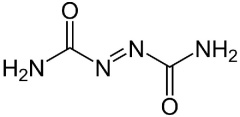Azodicarbonamide
Synonimes:Evipor, Azodicarbonamide, 1,1'-azobis formamide, 1,1'-azobisformamide, ADCA, Azo-di-karbonamid
CAS: 123-77-3

PROPERTIES
1,1'-azobisformamide (azodicarbonamide, ADCA) exists at ambient temperatures as a yellow to orange red crystalline powder. It is slightly soluble in water. Highly flammable. Incompatible with strong oxidizing agents, strong acids, strong bases, heavy metal salts. ADCA is an efficient exothermic foaming agent generating mostly nitrogen and carbone dioxide gas. ADCA is an electron acceptor so act as an oxidizing agents.
It is known as E number E 927.
APPLICATIONS
PLASTICS
FOAMING AGENT
The thermal decomposition of azodicarbonamide results in the evolution of nitrogen, carbon monoxide, carbon dioxide, and ammonia gases, which are trapped in the polymer as bubbles to form a foamed article. This is widely used in production of PVC, PP, LDPE, EVA and other plastic foaming articles like window and door gaskets, padded floor mats, gym/exercise mats or shoe soles.
ADCA can be pure or modified and modification affects the reaction temperatures.
ELECTRONICS
FORMING RIBBED BATTERY SEPARATORS
Ribs are formed on a nonwoven mat to produce a battery separator. The ribs are formed by extruding a foamed polymer onto the nonwoven mat by extruding the foamed polymer through a multi-hole die as the nonwoven mat follows an arc passing over a mat backup plate. After the ribs have been extruded and the foamed polymer is still soft, the nonwoven mat with the extruded ribs may be passed through a fixed gap such as a pair of calender rolls to produce a battery separator of uniform thickness.
FOOD
BLEACHING AGENT, IMPROVING AGENT
Azodicarbonamide is applied as a flour-maturing agent currently being promoted for use in the baking of commercial breads. ADCA functions as a dual oxidant in the maturation of wheat flour. It not only bleaches flour by oxidizing carotene in fresh flour, but also improves flour strength by oxidizing cysteine. The increased strength improves the gas retention of dough and elasticity of bakery products The main reaction product is biurea, which is stable during baking. Secondary reaction products include semicarbazide and ethyl carbamate.
PHOTO
BLEACHING AGENT
ADCA appeared useful in a process for bleaching photographically developed silver comprising contacting the developed silver with an aqueous processing solution containing azodicarbonamide as a bleaching agent.
Additional information:
The United States allows azodicarbonamide to be added to flour at levels up to 45 ppm. Unlike in Australia and in Europe, where the use of azodicarbonamide as a food additive is banned. In Singapore, the use of azodicarbonamide can result in up to 15 years imprisonment and a fine of $450,000.
| CAS | Name of article | Recent inventory | Package unit | Request offer |
| 123-77-3 | 1,1'-Azobisformamide | 749.00 kg | 42 kg/drum |
Kat-Chem Kft.
Székhely
Beckó utca 23-25.
H-1149
Budapest
Iroda
Huszt u. 24.
H-1147
Budapest
Telefon: +3612219945, +3613630194
Fax: +3613835784
E-mail: kat-chem@kat-chem.hu
